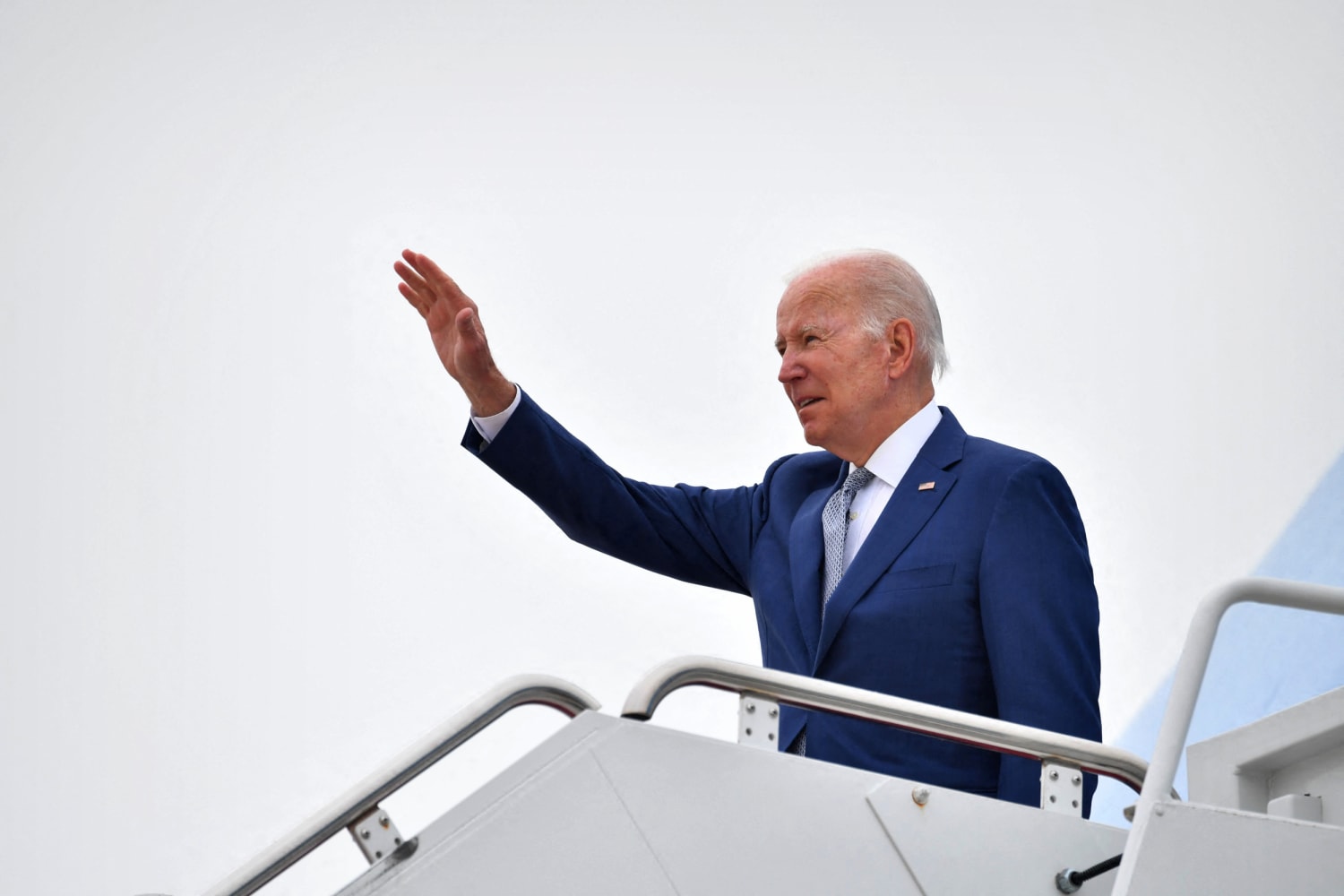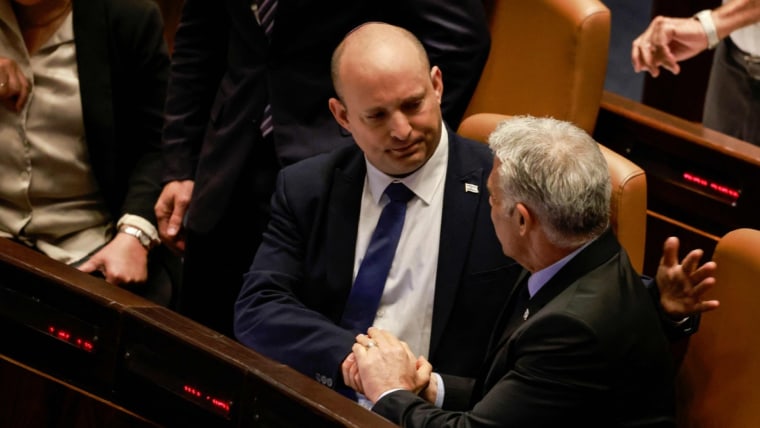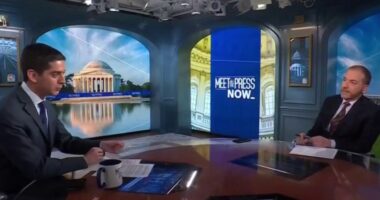JERUSALEM — When President Joe Biden touches down in Israel on Wednesday for a series of meetings there and in the West Bank before heading to Saudi Arabia, he will find himself treading carefully around political land mines both foreign and domestic, where any missteps could have wide-ranging consequences.
For much of Biden’s time in office, the Middle East has taken a back seat as an area of concern to China and Russia, and the president hasn’t made progress on his campaign pledge to improve human rights in the region. But the region remains key to Biden’s wider domestic and foreign policy goals, including the revival of a nuclear deal with Iran, maintenance of stability in the region, and the lowering of record high gas prices.
As the president focuses on diplomacy overseas, he will have to contend with political pressure back home from some members of his own party urging him to lean harder with regard to human rights issues on every leader with whom he plans to meet. He also arrives in the region on shaky ground politically, given doubts around whether Democrats will be able to hold on to control in Washington come November and Biden’s own political future.
Here are five things to watch for this week during Biden’s first presidential trip to the Middle East:
Meeting with the ‘pariah’
Even before leaving, Biden was on the defensive over his decision to travel to Saudi Arabia, writing an op-ed in The Washington Post explaining the visit to a country he once referred to as a “pariah” amid criticism from members of his own party.
“I know that there are many who disagree with my decision to travel to Saudi Arabia,” Biden wrote. “My views on human rights are clear and long-standing, and fundamental freedoms are always on the agenda when I travel abroad, as they will be during this trip, just as they will be in Israel and the West Bank.”
But the visit seemingly represents a retreat from his campaign rhetoric, which vowed to punish Saudi Arabia for the killing of Washington Post journalist Jamal Khashoggi by ending military sales to the country to “make them pay the price and make them, in fact, the pariah that they are.”
Now, though, his administration is looking for a reset with the Saudis, who play a key role in the global oil market and in helping maintain wider stability in the Middle East, senior administration officials have said.
“The basic thrust and purpose of our policy with respect to Saudi Arabia has been to recalibrate the relationship but not rupture it,” Jake Sullivan, Biden’s national security adviser, said in a briefing with reporters on Monday. “We have stayed true to that from the beginning of this administration.”
Biden will hold a bilateral meeting with King Salman, but he isn’t expected to meet one-on-one with the de facto leader Crown Prince Mohammed bin Salman, known as MBS, who the U.S. intelligence community concluded was behind the murder of Khashoggi. Instead, the White House has sought to emphasize that the crown prince will participate in a larger meeting with the king and his leadership team, which MBS is a part of.
“I’m not going to meet with MBS, I’m going to an international meeting and he’s going to be a part of it,” Biden said last month.
Sullivan declined to say whether Biden would raise the issue of Khashoggi’s murder with the Saudis.
While in Saudi Arabia, Biden will attend a meeting of the Gulf Cooperation Council, which includes Bahrain, Kuwait, Oman, Qatar, Saudi Arabia and the United Arab Emirates. Egypt, Iraq and Jordan will also attend.
Oil on the agenda?
Despite traveling to an oil-rich nation while gas prices surge at home, Biden has sought to downplay any intent to address oil prices during his trip, and said he wouldn’t make any specific requests of the regime with regards to increasing oil production.
“No, I’m not going to ask them,” Biden told reporters last month when he was asked if he would request the Saudis to increase production during the visit. “All the Gulf States are meeting. I’ve indicated to them that I thought they should be increasing oil production, generically, not to the Saudis particularly, and I think we’re going to — I hope we see them, in their own interest, concluding that makes sense to do.”
Biden made just a passing mention of oil in his Washington Post op-ed on the trip.
Rather, Biden said, attention on the trip would remain on larger regional issues at a summit of Gulf states, with the White House emphasizing the focus will be on ending the war in Yemen, addressing terrorism threats and normalizing relations between Israel and other countries in the region.
Any talk of oil would be in more general terms, Sullivan said on Monday.
“We will have the opportunity among this very broad agenda to talk about energy security with the leaders of the OPEC nations in the Middle East, just as we discussed energy security when he was on his trips in Europe and in the Indo-Pacific, and we will see what results come from that,” Sullivan said. “Ultimately, that will be up to the OPEC countries to determine.”
But oil would be the top deliverable a trip to Saudi Arabia could provide to the American consumer — without it, it’s unclear what Biden might be seeking to bring back from the controversial stop.
Even if Biden were to convince the Saudis to increase their oil production, it’s unclear how much additional capacity they have — and any impact on gas prices would be limited given a lack of refinery capacity in the U.S. to turn oil into gasoline.
“Even if Saudi Arabia were to crank up crude oil production, crude oil would trade lower, but really, the big problem in this country is the problem with gasoline. And gasoline is just a function of supply and demand,” said Bob Yawger, an executive director for energy futures at financial firm Mizuho Americas. “You can increase production all you want, but you can only run so many barrels through the refineries in the United States.”
Navigating Israeli politics
Biden will arrive in Israel just weeks after a major upheaval in the government that unseated prime minister Naftali Bennett and triggered another Israeli election in November, the fifth in less than four years. Instead of Bennett, Biden will sit down with Yair Lapid, who is serving as the caretaker prime minister and could use the meeting with the U.S. president to help bolster his image as he campaigns for the permanent job as head of Israel’s government.
Regardless of the change in leadership, Biden will look to reaffirm the U.S. commitment to Israel’s security and efforts to normalize relations throughout the Middle East, even as it has fallen further down the list of priorities on the U.S. foreign policy agenda, senior administration officials said.
“I’m going to Israel to meet with Israeli leaders to affirm the unbreakable bond Israel and the United States have,” Biden told reporters last month. “And part of the purpose is, the trip to the Middle East, is to deepen Israel’s integration in the region, which I think we’re going to be able to do and which is good, good for peace and good for Israeli security.”
Israel has been looking to improve relations with other countries in the region, including Saudi Arabia, an effort that Biden could help facilitate during his visit. One issue that has been on the table is allowing direct flights from Israel to Saudi Arabia for Israeli Muslims to make the hajj pilgrimage, and lifting other air restrictions for Israeli flights over the country.
Biden is also planning to meet with former prime minister Benjamin Netanyahu, as it is customary for visiting presidents to also meet with the head of the Israeli opposition party, Sullivan said. Biden and Netanyahu, who was a close ally of Trump and is fighting to regain his old job in the upcoming elections, have a complex history together going back 40 years to Biden’s days as a senator.
Lingering over his visit with Israeli officials will also be the death of Palestinian-American journalist Shireen Abu Akleh, for which human rights and journalist advocacy groups have pushed for Biden to hold Israel accountable. The U.S. concluded earlier this month that Abu Akleh was most likely killed by gunfire from Israeli military positions, but U.S. investigators have said they couldn’t reach a definitive conclusion about the origins of the bullet that killed her, the State Department said.
Investigations by the United Nations and independent Western media organizations found that Israeli fire led to her death.
Balancing Palestinian demands
Biden will also meet with Palestinian Authority President Mahmoud Abbas, whom Biden has also known for decades, during a visit to the West Bank.
While the Biden administration’s relations with the Palestinians have greatly improved from those of the Trump administration, which cut off nearly all communication, there are low expectations among the Palestinian leadership of movement on any of their key requests, foreign policy analysts said.
Palestinian leaders have been pushing the Biden administration to reopen the U.S. consulate in East Jerusalem and for Biden to more vocally oppose Israeli settlements in the West Bank, along with the wider issue of addressing the Palestinian desire for an independent state with a capital in East Jerusalem.
In a potential sign of progress ahead of Biden’s visit, Lapid spoke with Abbas by phone on Friday, the first publicly acknowledged contact between Israeli and Palestinian leadership in five years.
Pressure from back home
Ahead of the trip, Biden has been criticized by members of his own party for his visit to Saudi Arabia and been urged to put more pressure on the Israelis around the issue of settlements.
Sen. Ron Wyden, D-Ore, said Biden should insist the Saudis hold those accountable who are responsible for human rights abuses, and Sen. Dick Durbin, D-Ill., said he had “mixed feelings” about the trip given Saudi Arabia’s human rights record.
“America does not become more secure by legitimizing authoritarians like Mohammed bin Salman,” Wyden said in a statement.
Meanwhile, a group of more than two dozen members of Congress wrote Biden a letter ahead of the trip asking him to urge Israel to halt its settlements in the West Bank, and human rights groups are pushing him to do more to hold Israel accountable for Abu Akleh’s death.
Defending the visit, Sullivan said Biden has a long track record of defending human rights, and would continue to do so this week.
“Human rights is going to remain a feature of his agenda and an important feature of his agenda,” Sullivan said. “And it will be on display while we’re on this trip as well.”
Source: | This article originally belongs to Nbcnews.com












